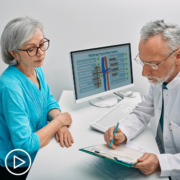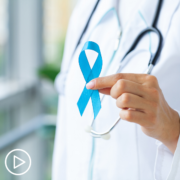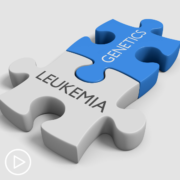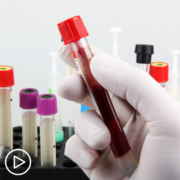How Will You Know if Your Lung Cancer Treatment Is Working?
How Will You Know if Your Lung Cancer Treatment Is Working? from Patient Empowerment Network on Vimeo.
How do lung cancer experts determine if a treatment approach is working? Expert Dr. Heather Wakelee explains how treatment effectiveness is monitored and what should be analyzed when treatments stop working.
Dr. Heather Wakelee is a thoracic medical oncologist and deputy director of the Stanford Cancer Institute where she also serves as the division chief of medical oncology. Learn more about Dr. Wakelee, here.
See More From INSIST! Lung Cancer
Related Programs:

|

How Are Targeted Therapy and Immunotherapy Used in Lung Cancer Care? |
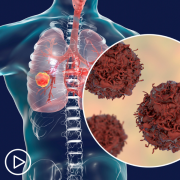
What Are the Advantages of Newer Lung Cancer Treatment Approaches? |
Transcript:
Katherine:
We have a question that we received from an audience member earlier. Jeff asks, “How do you know if your lung cancer treatment is working?”
Dr. Wakelee:
So, there are a lot of ways of knowing if treatment is helping. So, the one I rely on the most is, “Does the patient overall feel better?” That is difficult to say exactly how. Sometimes people are having breathing problems; they feel that that’s better. Sometimes their energy’s lower. They feel better. It can be vague. We also use scans. So, we tend to get scans, depending on the treatment we’re giving, every couple of months plus or minus, sometimes, every three months to help track what’s actually going on. But occasionally, there are discrepancies.
So, sometimes, the scan, is it better? Is it not better? Can’t really tell. And then, you’re always taking that, “How does the patient feel?” So, usually, if the scans are better, the patient feels better. It’s easy. Usually if the patient’s feeling worse and the scan looks worse, clear decision. Not a good one, but clearly, we need to do something different. But sometimes, you’re left, and especially this happens with the first scan because you get a scan, it takes a little while, you start the new treatment, then you get the next scan, how much of the changes happened before you started the new one and how much didn’t? So, these can be more challenging conversations, but generally if the patient’s feeling a little bit better, the scan’s unclear, we usually say, “You know, let’s give this treatment a little bit more time.” We also, I think your question was specifically around how do we tell if it’s working, but you also often need to be thinking about, “Well, what’s it doing that’s negative to the person and is that potential, those side effects worth the benefits we are or are not seeing?”
So, it’s kind of all of those things together. It can be a bit complex.
Katherine:
What goes into the decision to change therapies if it becomes necessary?
Dr. Wakelee:
So, when we’re thinking about making a change, the way I always look at it is, is where we are today still okay or not? And, if it’s not, that would be because clearly the cancer’s growing or clearly the side effects are just not tolerable. Then, we decide together with the patient we need to do something different. And, when we think about what do we do next, we look at what have we’ve already done, did it work or not, if not, let’s do something more different. And so, let’s think about something that might be somewhat similar. When we’re dealing with targeted therapies, we have ways to try to figure out what changed in the tumor that made it now resistant or not working with that treatment.
And so, with some of the pill drugs, there’s been a lot of research and understanding how does the tumor change that helps it evade, get away from, be resistant to whatever treatment you’re on.
And then, sometimes, we have other pill drugs that work in that particular setting, not always. With immune therapy, we’re trying to better understand why does the immune therapy stop working?
Sometimes you can add back to it, like, you can add chemotherapy back to immune therapy alone or sometimes you can do radiation with immune therapy to get that response back. Or, add other combinations to it. So, that’s another thing that we’re working on. And then, like I said, if someone hasn’t ever had chemotherapy and the tumor’s become resistant, we’re going to be thinking a lot about chemo because that can play a role against so many different reasons that the cancer might not be responding to whatever treatments someone’s on. And then also, looking at how the patient’s feeling and doing, what their overall what we call “performance status, ” their sort of overall health, and how well do we feel with them that they’re going to be able to tolerate the next treatment because, you’re always having to weigh how much is this likely to help, and how might this harm in finding the right balance.


